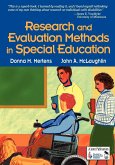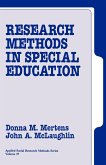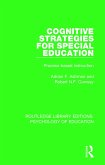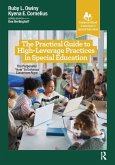- Broschiertes Buch
- Merkliste
- Auf die Merkliste
- Bewerten Bewerten
- Teilen
- Produkt teilen
- Produkterinnerung
- Produkterinnerung
Research Methods in Special Education equips readers with the knowledge needed to make a difference with data.
Andere Kunden interessierten sich auch für
![Research and Evaluation Methods in Special Education Research and Evaluation Methods in Special Education]() Donna M. MertensResearch and Evaluation Methods in Special Education46,99 €
Donna M. MertensResearch and Evaluation Methods in Special Education46,99 €![Research Methods in Special Education Research Methods in Special Education]() Donna M. MertensResearch Methods in Special Education106,99 €
Donna M. MertensResearch Methods in Special Education106,99 €![The Pedagogy of Special Needs Education The Pedagogy of Special Needs Education]() Chizuko FujitaThe Pedagogy of Special Needs Education42,99 €
Chizuko FujitaThe Pedagogy of Special Needs Education42,99 €![Cognitive Strategies for Special Education Cognitive Strategies for Special Education]() Adrian F. AshmanCognitive Strategies for Special Education60,99 €
Adrian F. AshmanCognitive Strategies for Special Education60,99 €![The Practical Guide to High-Leverage Practices in Special Education The Practical Guide to High-Leverage Practices in Special Education]() Ruby L. OwinyThe Practical Guide to High-Leverage Practices in Special Education53,99 €
Ruby L. OwinyThe Practical Guide to High-Leverage Practices in Special Education53,99 €![Supporting Paraeducators in Special Education and Inclusive Settings Supporting Paraeducators in Special Education and Inclusive Settings]() Emily SobeckSupporting Paraeducators in Special Education and Inclusive Settings42,99 €
Emily SobeckSupporting Paraeducators in Special Education and Inclusive Settings42,99 €![Specially Designed Instruction for Special Education Specially Designed Instruction for Special Education]() Rosemary TralliSpecially Designed Instruction for Special Education70,99 €
Rosemary TralliSpecially Designed Instruction for Special Education70,99 €-
-
-
Research Methods in Special Education equips readers with the knowledge needed to make a difference with data.
Hinweis: Dieser Artikel kann nur an eine deutsche Lieferadresse ausgeliefert werden.
Hinweis: Dieser Artikel kann nur an eine deutsche Lieferadresse ausgeliefert werden.
Produktdetails
- Produktdetails
- Verlag: Routledge
- Seitenzahl: 320
- Erscheinungstermin: 15. August 2021
- Englisch
- Abmessung: 254mm x 178mm x 17mm
- Gewicht: 605g
- ISBN-13: 9781630917562
- ISBN-10: 1630917567
- Artikelnr.: 70971183
- Herstellerkennzeichnung
- Libri GmbH
- Europaallee 1
- 36244 Bad Hersfeld
- gpsr@libri.de
- Verlag: Routledge
- Seitenzahl: 320
- Erscheinungstermin: 15. August 2021
- Englisch
- Abmessung: 254mm x 178mm x 17mm
- Gewicht: 605g
- ISBN-13: 9781630917562
- ISBN-10: 1630917567
- Artikelnr.: 70971183
- Herstellerkennzeichnung
- Libri GmbH
- Europaallee 1
- 36244 Bad Hersfeld
- gpsr@libri.de
Brittany L. Hott, PhD, BCBA-D is an associate professor in the Department of Educational Psychology at the University of Oklahoma in Norman, Oklahoma. Prior to joining the faculty at the University of Oklahoma, Dr. Hott served as an associate professor in the special education program and STRIDE lab director at Texas A&M University-Commerce. She has more than a decade of public school experience, serving in numerous capacities, including as a classroom teacher, special education coordinator, and district instructional specialist. Dr. Hott currently teaches graduate assessment and measurement, introductory research methods, and single case research design courses. Her interests include assessment and measurement, evidence-based practice, and the effective translation of special education research to practice. The majority of her work is completed in collaboration with rural and remote districts. She is an associate editor for Rural Special Education Quarterly and is a member of the Learning Disability Quarterly, Remedial and Special Education, and Teacher Education and Special Education review boards. Dr. Hott's work has been recognized by the Texas Council for Exceptional Children, the International Council for Learning Disabilities, and the Teacher Education Division of the Council for Exceptional Children. Frederick J. Brigham, PhD is a professor of special education at George Mason University in Fairfax, Virginia. Prior to a career in higher education, Dr. Brigham served as a classroom teacher in special and general education and as a school administrator (program coordinator, director of special education). His tenure includes serving on the faculties of Valparaiso University, Bowling Green State University, The University of Virginia, and George Mason University. Dr. Brigham was editor of Behavioral Disorders for two terms and served as an associate editor for Exceptional Children. Dr. Brigham is past president of the Council for Exceptional Children-Division for Research. His interests include response to intervention, educational assessment, secondary content instruction, and research methods. Corey Peltier, PhD is an assistant professor in the Department of Educational Psychology at the University of Oklahoma in Norman, Oklahoma. He leads the Achievement in Mathematics Lab, whose aim is to improve mathematical outcomes for all students by conducting rigorous, high-quality research and disseminating new knowledge to preservice and practicing teachers. Two secondary interests of Dr. Peltier are the use of meta-analysis to inform policy and practice and improving single case research design methodology to increase its use in determining evidence-based practices in the field of special education. Dr. Peltier teaches courses related to single case research design, assessment, and meta-analysis. Dr. Peltier serves on numerous editorial review boards including Assessment for Effective Intervention, Remedial and Special Education, and School Psychology Review.
Dedication Acknowledgments About the Authors Contributing Authors Preface
Chapter 1 Evidence-Based Practice in Special Education: Constructing an
Operational Definition Chapter 2 Introduction to Special Education Research
Chapter 3 Conducting Research in Applied Settings: Practical Strategies for
Forming Effective Partnerships Chapter 4 Ethical Considerations in Special
Education Research Chapter 5 Identifying, Locating, and Evaluating
Educational Research Chapter 6 Systematic Literature Reviews Chapter 7
Correlational Designs Chapter 8 Experimental Designs Chapter 9
Quasi-Experimental Designs Chapter 10 Single Case Research Designs Chapter
11 Survey Research Chapter 12 Qualitative Research Chapter 13 Mixed-Methods
Research Chapter 14 Program Evaluation Chapter 15 Translating Special
Education Research to Practice Financial Disclosures Index
Chapter 1 Evidence-Based Practice in Special Education: Constructing an
Operational Definition Chapter 2 Introduction to Special Education Research
Chapter 3 Conducting Research in Applied Settings: Practical Strategies for
Forming Effective Partnerships Chapter 4 Ethical Considerations in Special
Education Research Chapter 5 Identifying, Locating, and Evaluating
Educational Research Chapter 6 Systematic Literature Reviews Chapter 7
Correlational Designs Chapter 8 Experimental Designs Chapter 9
Quasi-Experimental Designs Chapter 10 Single Case Research Designs Chapter
11 Survey Research Chapter 12 Qualitative Research Chapter 13 Mixed-Methods
Research Chapter 14 Program Evaluation Chapter 15 Translating Special
Education Research to Practice Financial Disclosures Index
Dedication Acknowledgments About the Authors Contributing Authors Preface
Chapter 1 Evidence-Based Practice in Special Education: Constructing an
Operational Definition Chapter 2 Introduction to Special Education Research
Chapter 3 Conducting Research in Applied Settings: Practical Strategies for
Forming Effective Partnerships Chapter 4 Ethical Considerations in Special
Education Research Chapter 5 Identifying, Locating, and Evaluating
Educational Research Chapter 6 Systematic Literature Reviews Chapter 7
Correlational Designs Chapter 8 Experimental Designs Chapter 9
Quasi-Experimental Designs Chapter 10 Single Case Research Designs Chapter
11 Survey Research Chapter 12 Qualitative Research Chapter 13 Mixed-Methods
Research Chapter 14 Program Evaluation Chapter 15 Translating Special
Education Research to Practice Financial Disclosures Index
Chapter 1 Evidence-Based Practice in Special Education: Constructing an
Operational Definition Chapter 2 Introduction to Special Education Research
Chapter 3 Conducting Research in Applied Settings: Practical Strategies for
Forming Effective Partnerships Chapter 4 Ethical Considerations in Special
Education Research Chapter 5 Identifying, Locating, and Evaluating
Educational Research Chapter 6 Systematic Literature Reviews Chapter 7
Correlational Designs Chapter 8 Experimental Designs Chapter 9
Quasi-Experimental Designs Chapter 10 Single Case Research Designs Chapter
11 Survey Research Chapter 12 Qualitative Research Chapter 13 Mixed-Methods
Research Chapter 14 Program Evaluation Chapter 15 Translating Special
Education Research to Practice Financial Disclosures Index








